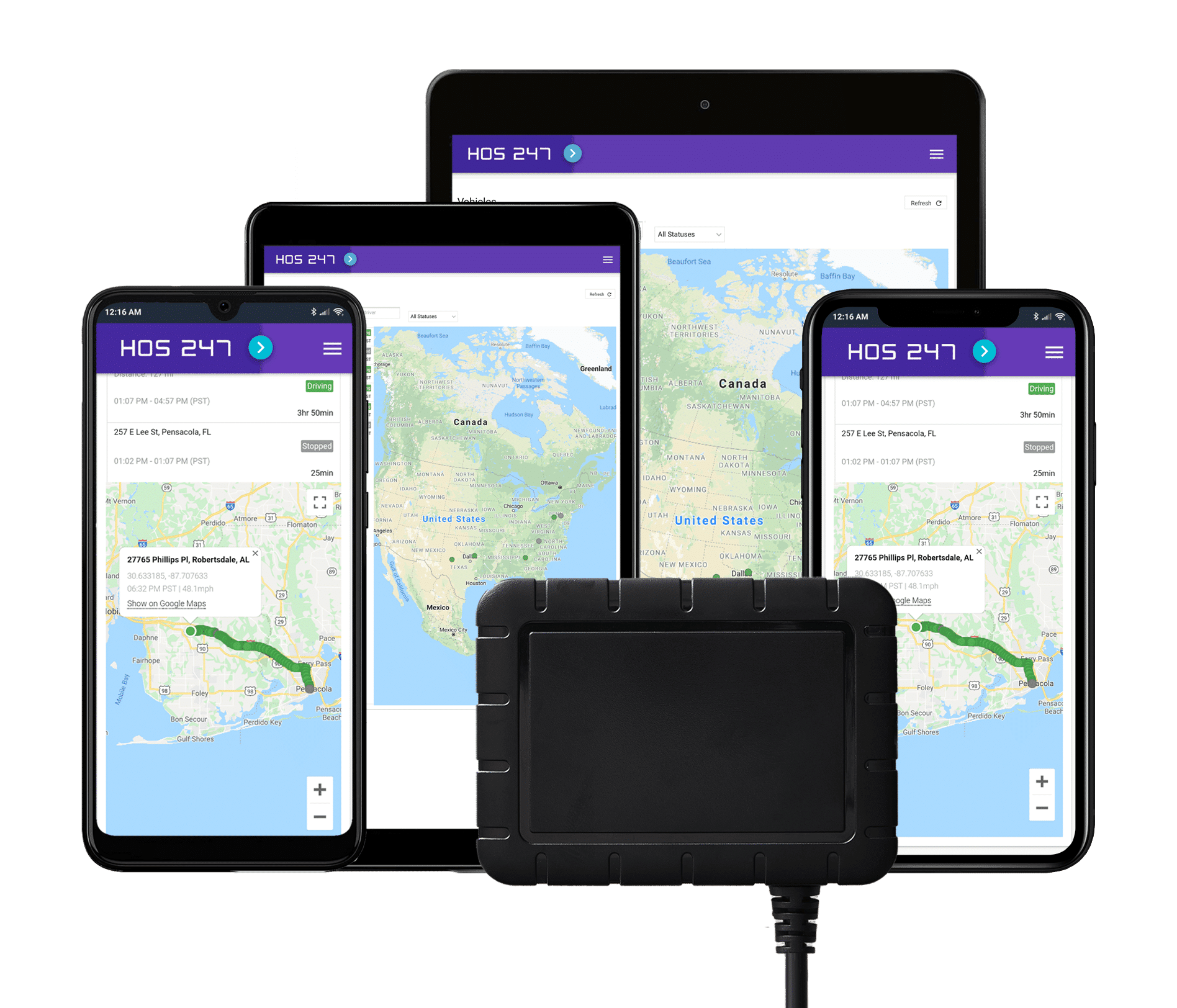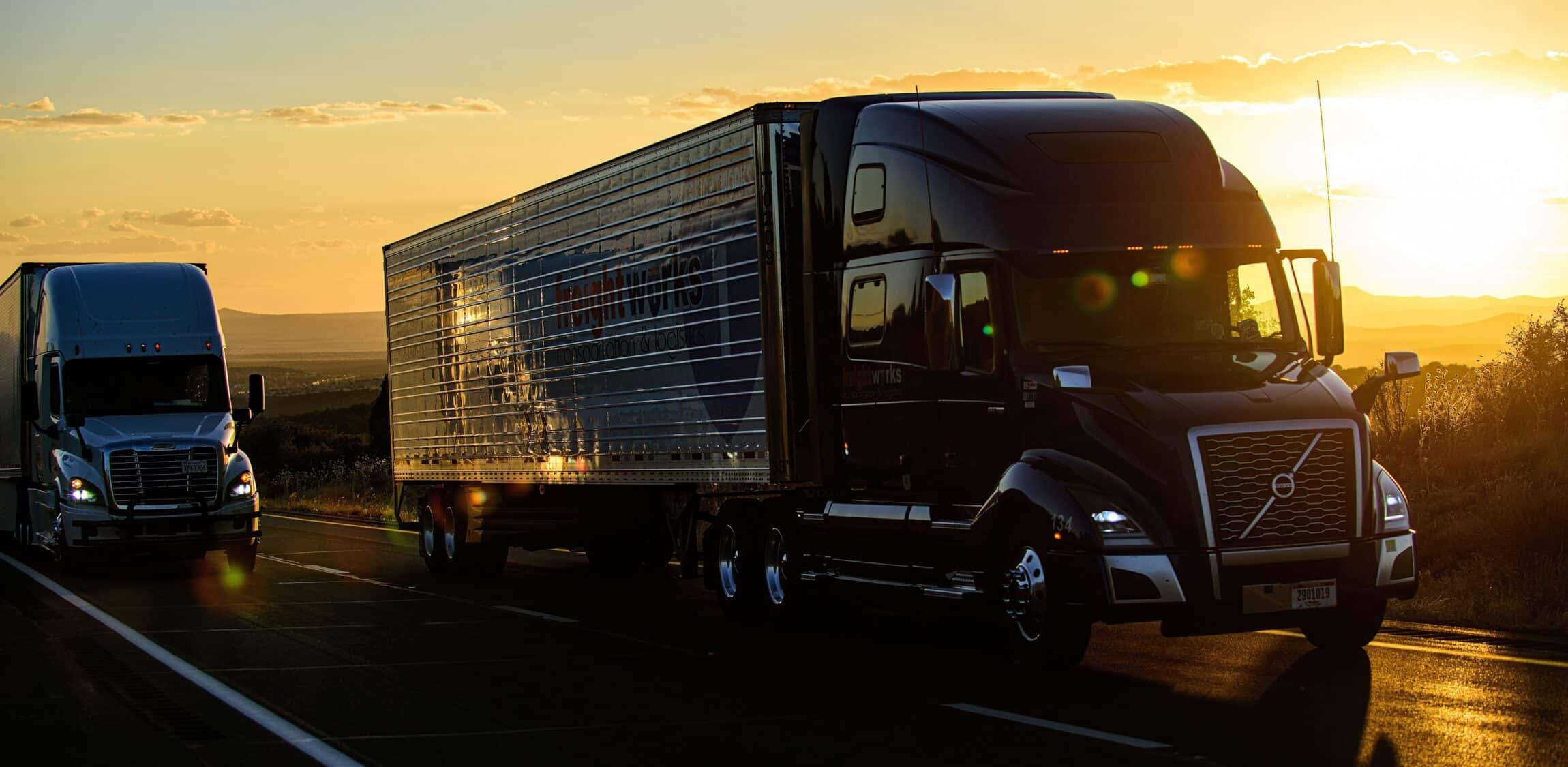GPS fleet tracking has become an essential tool in the trucking business as it helps improve security and operational efficiency significantly. Commercial truck GPS trackers allow motor carriers to monitor and manage vehicles in real-time using advanced telematics technology. Tracking device for commercial trucks collect vehicle-related data such as location, fuel level, speed, idle time, and other relevant details that help business owners gain more control over their operations and identify efficiency gaps to implement solutions that increase profitability.
Commercial truck GPS trackers connect to vehicles’ diagnostics ports to transmit the data obtained from the engine to the fleet management portal via cellular or satellite networks. This information is analyzed and organized for managers to streamline and improve work processes. Devices for commercial truck tracking also provide drivers with fault code alerts to comply with safety regulations. With a reliable tracking device for commercial trucks, motor carriers may significantly lower overall operational and fuel costs, increase productivity, and improve customer service. This article will share tips on choosing the best GPS tracker for your business.
Do you have any questions? Talk to ELD Advisor: 650-405-3372 or Request Callback
Types of Commercial Truck GPS Trackers
When selecting a commercial truck GPS tracker for your fleet, understanding the different types available on the market can help you make an informed decision. Each type offers distinct advantages depending on your specific business needs and operational requirements.
Hardwired vs. Plug-and-Play Options
Hardwired GPS trackers connect directly to the vehicle’s electrical system, providing a permanent and tamper-resistant installation. These devices offer continuous power supply and are ideal for businesses seeking a long-term tracking solution. The installation process typically requires professional assistance but results in a concealed device that operates reliably without driver intervention.
Plug-and-play GPS trackers, on the other hand, simply connect to the vehicle’s OBD-II port or diagnostic connector. These devices offer quick installation without specialized tools or technical knowledge. Fleet managers can easily move these devices between vehicles when necessary, making them perfect for rotating fleets or businesses testing GPS technology before committing to a permanent solution.
Portable vs. Fixed Installation Devices
Portable GPS trackers are compact, battery-powered units that can be placed anywhere in the vehicle without requiring connection to the vehicle’s electrical system. These devices offer flexibility and ease of transfer between vehicles but require regular battery charging or replacement. They’re particularly useful for temporary tracking needs or for monitoring trailers and non-powered assets.
Fixed installation devices are permanently mounted to the vehicle and connected to its power source. These trackers provide consistent, reliable tracking without maintenance concerns like battery replacement. They’re typically more robust in harsh conditions and offer advanced features like engine diagnostics and driver behavior monitoring.
Basic Tracking vs. Advanced Telematics Solutions
Basic tracking systems provide fundamental location information, showing where vehicles are in real-time and recording trip histories. These solutions are cost-effective for small fleets primarily concerned with vehicle location and route verification.
Advanced telematics solutions extend far beyond simple location tracking to include comprehensive vehicle diagnostics, driver behavior analysis, and predictive maintenance capabilities. These systems collect data on fuel consumption, engine performance, idle time, harsh braking, rapid acceleration, and more. The detailed insights help fleet managers identify operational inefficiencies and implement targeted improvements.
Asset-Only Trackers vs. Full Fleet Management Systems
Asset-only trackers focus specifically on monitoring the location and movement of trailers, containers, and other non-powered equipment. These specialized devices typically feature extended battery life and ruggedized construction for outdoor environments.
Factors to Consider When Choosing a Commercial Fleet GPS Tracking System
A reliable tracking device for commercial trucks offers services that streamline daily tasks, improving work conditions for drivers, fleet managers, and motor carriers. However, there are some crucial factors that will influence workflows and the overall efficiency of the system. Let’s see what these factors are and how to make the best decision.
- Make sure that the hardware is compatible with all your vehicles. Are you an owner of a fleet that contains trucks of different sizes? If this is the case, you have to look for a system that will function in all of them.
- Choose a system that is easy to install. If members of your crew struggle to understand how to install a commercial truck GPS tracker, that might delay its implementation. A system requiring special installation is not practical as you may have to pay extra to set it up. Choose a device that guarantees easy and straightforward installation.

- Look for hardware with user-friendly software. If your truckers find the software overcomplicated, they will have difficulty using it properly, which might lead to compliance issues. Make sure that the system you choose is user-friendly.
- Watch out for outdated technology. Some providers still use the 3G network for their GPS devices, even though it will be completely shut down in the US by the beginning of 2023. Make sure you choose a system that integrates 4G to avoid inconveniences.
- Choose a provider that offers real-time tracking. Another important factor is data accuracy. Some trackers offer hourly updates, but real-time information is preferable since it considerably improves workflow and security, helping fleet managers and dispatchers organize operations more efficiently.
- Ensure that technical support is efficient. Reliable customer service should help truckers troubleshoot complicated issues, clarify their doubts about the product and provide competent training to familiarize them with the system if needed. Try calling the provider to check how readily available they are to offer assistance.
- Ask for a demo to test the system. Before committing to anything, we recommend you ensure that the GPS tracker you choose works for you. A trial period will help you familiarize yourself with the device and decide if it is worth your investment.
Benefits of HOS247 4G Commercial Fleet GPS Tracking
At HOS247, we make sure our devices are dependable, efficient, and easy to use. Our resistant hardware, user-friendly software, flexible plans and expert technical support team have earned us top ratings from transportation professionals. Choosing our truck tracker, carriers will enjoy the following benefits:
- Reduced expenses. GPS telematics technology integrated into a fleet maintenance platform can prevent costly repairs by providing timely alerts based on accurate data derived from odometer readings. Additionally, the idle reporting feature provides insights about fuel consumption. Reducing idling and speeding will also contribute to reduce operating costs.
- Automated paperwork. The data collected by the GPS device is processed to avoid time-consuming paperwork, automatically scheduling vehicle maintenance routines and other vital tasks. Automatic IFTA mileage calculations lift the burden of manually working out fuel tax by jurisdiction and reduces audit risk.
- Improved customer service. Real-time tracking helps logistic managers optimize dispatch choosing the quickest routes and providing their customers with accurate information about the delivery.
- Enhanced security. Hidden GPS trackers allow managers to monitor the vehicle location in case of theft, and recover stolen assets. They also get notifications when the truck is driven to an authorized location.
- Advanced technology. HOS247 devices are enhanced with 4G technology that allows updating tracking information every 30 seconds, providing managers with the most accurate data.
Return on Investment: Calculating the Value of GPS Tracking
Implementing GPS tracking delivers measurable financial benefits across multiple operational areas:
Fuel Savings
GPS tracking reduces fuel costs through route optimization, idle time monitoring, and driver behavior management. By eliminating unnecessary miles and preventing fuel-inefficient driving habits, fleets typically see significant reductions in overall fuel consumption.
Insurance Benefits
Many insurance providers offer premium discounts for GPS-equipped fleets due to reduced accident risk, theft recovery capabilities, and improved claim defense. These savings alone can offset a substantial portion of the system cost.
Theft Prevention and Recovery
GPS tracking dramatically improves vehicle and cargo recovery rates after theft incidents. Beyond the obvious asset protection, this technology reduces costly operational disruptions and preserves customer relationships.
Maintenance Optimization
Preventive maintenance based on actual mileage and engine diagnostics extends vehicle lifespan while reducing repair costs. Automatic service scheduling and early problem detection prevent costly breakdowns and extend asset utilization.
Productivity Improvements
Better dispatching, reduced paperwork, and elimination of time theft create substantial labor efficiency gains. These improvements allow more deliveries per day with the same workforce or maintaining service levels with fewer resources.
Customer Satisfaction
Improved on-time delivery rates, accurate arrival estimates, and documented proof of service enhance customer experience. Satisfied customers stay longer and purchase more, directly impacting revenue growth and profitability.

Legal Aspects of Commercial Truck GPS Tracker Usage
In the digital age, privacy issues have become one of the biggest concerns in any field, and fleet businesses are no exception. Even being completely legal, GPS tracking may raise questions about ethical and legislative aspects of human rights. By installing a tracking device for commercial trucks, motor carriers monitor both their vehicles and drivers who operate them.
The question is: what should business owners do to avoid invading the privacy of their employees while using commercial fleet gps tracking? Here are some recommendations that will help you enjoy the perks of this technology without getting into trouble:
- It is legal to use a tracking device for commercial trucks in the vehicles and assets you own.
- Employees must be made aware of the fact that the vehicle they use is being tracked.
- GPS trackers can be used only for business-related purposes.
Business owners must always keep in mind that transparency with employees is necessary when dealing with commercial truck GPS trackers.
Do You Need GPS to Comply with the ELD Mandate?
To comply with FMCSA regulations, ELDs use GPS technology to keep appropriate HOS records. However, these devices’ accuracy level is much lower than commercial fleet GPS tracking—the radius is approximately 10 miles. The tracking function is suppressed by the ELD system on purpose in order to provide truck drivers with some privacy. This accuracy is enough to capture basic information about the vehicle’s location to comply with the mandate rules, but without a specialized tracking device for commercial trucks, business owners can’t take full advantage of this technology.
Fleet owners who use HOS247 ELDs with the hardwired commercial truck GPS tracker obtain the most accurate data in real-time, unlocking additional benefits that result in higher profits. Our system will help your business achieve compliance with the ELD rule and safety regulations established by the FMCSA while providing meaningful insights about areas of opportunity and how to correct them.
Benefits of Integrating GPS with ELD and Other Fleet Management Systems
Efficiency and compliance go hand in hand with profitability. Integrating ELD and GPS capabilities is a significant advancement for carriers looking to optimize their operations. Let’s explore how this strategy can transform your fleet management approach and deliver measurable returns on investment.
Hardware Consolidation Savings
Integrated systems eliminate redundant devices, reducing procurement costs and simplifying installation. HOS247’s unified approach lowers both initial investment and ongoing maintenance expenses compared to implementing separate solutions.
Streamlined Driver Experience
A single user interface reduces training requirements and improves driver acceptance. This simplified experience allows drivers to focus on driving safely rather than managing multiple technology systems.
Enhanced Compliance
Automatic correlation between location data and hours-of-service records strengthens regulatory compliance. This integration reduces violation risks and provides stronger documentation during inspections or audits.
Improved Maintenance Management
Combined GPS and engine diagnostic data creates a comprehensive maintenance system. Real-time monitoring identifies issues before they cause breakdowns, while accurate usage tracking ensures optimal service timing.
Unified Support
A single technology platform simplifies troubleshooting and technical assistance. HOS247 provides multilingual support seven days a week with a callback guarantee if a call drops, ensuring uninterrupted operation.

Conclusion
Implementing a commercial truck GPS tracker represents a strategic investment that delivers substantial returns across multiple aspects of fleet operations. From direct cost savings through fuel efficiency and maintenance optimization to improved customer satisfaction and regulatory compliance, the benefits extend throughout the business.
HOS247 offers a comprehensive, integrated solution that combines reliable GPS tracking with ELD compliance and fleet management capabilities. Our user-friendly interface, durable hardware, and exceptional customer support make implementation straightforward and valuable from day one.
Before selecting any GPS tracking system, we recommend taking advantage of trial periods to ensure the technology meets your specific needs. HOS247 offers a two-week risk-free trial, allowing fleet managers to experience our solution’s benefits without long-term commitment.
As technology continues to evolve, staying current with 4G connectivity and advanced telematics capabilities positions your fleet for future success. By choosing a provider committed to ongoing system development and customer support, you ensure your investment continues to deliver value for years to come.
For fleets of all sizes, the right GPS tracking solution transforms data into actionable insights, helping businesses operate more efficiently, safely, and profitably in an increasingly competitive industry.

I’ve co-founded, built and managed several transportation-related businesses. Now, I’m a founder and CEO of HOS247 – an AI Transportation Platform for trucking companies, freight brokers and other logistics operations. We are transitioning old-style operations to technology-advanced logistics entities and help them to grow their businesses. ELDs (electronic logging devices), fleet tracking and management 2.0 combined with AI-powered dispatch tools.












For truckers, compliance with regulations, especially the Federal Motor Carrier Safety Administration (FMCSA) mandates, is not just a requirement, but a critical component of safe and efficient operations. Among these regulations, the implementation of electronic logging devices (ELDs) has emerged

Understanding 4G LTE GPS Tracking Technology for Fleet Management 4G LTE GPS tracking technology is a significant step forward in fleet tracking management, offering fast, reliable connectivity for real-time vehicle monitoring. It’s a key tool for fleet owners, providing easy

As the trucking industry advances, the adoption of electronic logging devices (ELDs) is reshaping how commercial motor vehicle (CMV) drivers maintain their records of duty status (RODS). This article sheds light on key differences between paper and electronic CMV logbooks,